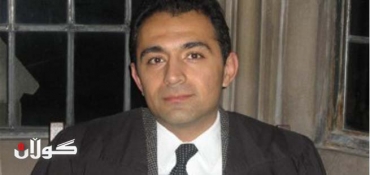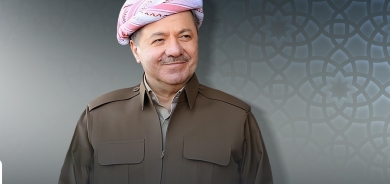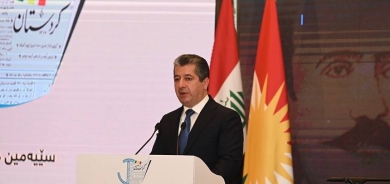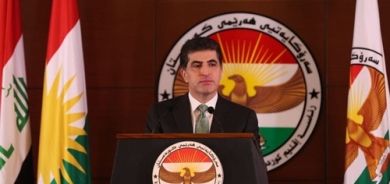Prof. Nader Hashemi to Gulan: "very worried about where things are headed" in the Middle East
June 27, 2013
Exclusive Interviews

Mr. Prof. Nader Hashemi is Assistant Professor and Director, Center for Middle East Studies and author of many articles and other publications, most recently in Philosophy & Social Criticism and Constellations. Author of Islam, Secularism, and Liberal Democracy: Toward a Democratic Theory for Muslim Societies (Oxford University Press, 2009) and co-editor of The People Reloaded: The Green Movement and the Struggle for Iran's Future (Melville House, 2011).An Interview with Mr. Prof. Nader Hashemi
Gulan: As you see the countries and societies in the Middle East are divided between Sunnis and Shias and there is a war going on under this. To what extent does the situation there distort the future of the countries?
Hashemi: the question of sectarianism between Sunni Muslims and Shia Muslims is emerging as a very important political issue that if not handled properly could tear apart the entire Middle East. This problem is partly the result of the foreign policies of Saudi Arabia and Iran who are using the Sunni-Shia question to advance their own interests in the region. Secondly, the ultra-conservative puritanical interpretation of Sunni Islam that is promoted by some clerics of Saudi Arabia is adding fuel to this fire. From a historical perspective and with an eye to the development of democracy, it should be pointed out that all societies that have large minority-majority cleavages, along ethnic lines or religious lines, struggle with this problem. If you look at the history of democracy in the West, one of the biggest issues that affected political stability and shaped the development of democracy was the debate over ethnic and religious rights. This took hundreds of years to resolve itself. In the case of Europe, it contributed to WWI and WWII which killed millions of people and so in this sense such problems are inevitable and part of the longer term struggle for democracy. Of course, this problem becomes much more difficult to resolve in the context of ongoing wars, mass killing, the prevalence of authoritarian regimes that have political interests and want to exploit sectarian differences as a way to advancing their own narrow interests which fundamentally are about preserving their own political power within their own countries. So I think this a very important political issue must be taken seriously. I’m personally very worried about where things are headed in large part because it will completely undermine the struggle for democracy throughout the region if it is not handled properly.
Gulan: why do think democracy is not developing in the Middle East while in other parts of the world like post communism countries are?
Hashemi: I think it is very dangerous to compare Eastern Europe with the Arab World because Eastern Europe's modern political history developed very differently than the Arab and the Islamic world. First, the social and economic underpinnings that are needed to sustain democracy in terms of the levels of modernization, socio-economic development, standards of living, and education levels were much higher in Eastern Europe than in the Middle East. Remember in Egypt today 40 percent of the population lives on two dollars a day and we have high levels of illiteracy, especially among women. Secondly, the modern Middle East has witnessed very high levels of foreign intervention and coupled with the destabilizing politics that flow from the Arab and Israeli conflict, which is a deeply emotionally charged political topic, this has complicated the prospects for democratization. So I think, it is very dangerous to assume that just because Eastern Europe had relatively smooth transition to democracy that we should expect the Arab World to have a similar smooth transition to democracy as well. Different societies have to go through their own periods and pathways to development based on their own timeline, not ours. In short, process of democracy will be very different in the Arab world as opposed to Eastern Europe because the modern history of the Arab and Islamic world has been very different than Eastern Europe.
Gulan: Some experts think that the non-Arab/Islamic countries get along with democracy much better than the Arab/Islamic countries, such as Turkey and Malaysia. So what is the difference between Arab/Islamic countries and non-Arab/Islamic countries?
Hashemi: One of the big differences is the question of oil which allows authoritarian regimes to have a longer lifeline than countries that do not produce oil. There is a long-standing political science concept known as the theory of a Rentier State which argues that countries that have oil at their disposal can resist the process of democratic transition much easier than those countries that are non-oil producing countries. So, one big argument is the political economy argument. Secondly, the question of the Arab Israeli conflict is central to the identity of the Arab world that I think it destabilizes the politics of these countries much more than we see in the Muslim countries that are non-Arabs such as Malaysia, Indonesia or Turkey to a certain extent. I would also add the very nature of the authoritarian regimes in the Arab world, especially Assad in Syria, Saddam in Iraq, Ben Ali in Tunis and Mubarak in Egypt were far more brutal and repressive than in say Malaysia, Indonesia or Turkey under the Kemalist generals. This has left a very bitter legacy that is created deep polarities within society that makes the process of democratization much more difficult. So those differences explain why the Arab world, largely speaking, is going to have a much more difficult time in transitioning to democracy than countries like Turkey, Malaysia or Indonesia.
Gulan: on the other hand, there are two fronts now in the Middle East, one is represented by Iran's Shia clerics, and the other is Sunnis which include most of the Arab countries and Turkey. However, the western countries support the Sunnis, so how does this affect the conflict in the region?
Hashemi: the fact that there is a widespread opposition to US intervention in the region this fact has allowed the Iranian government to exploit popular sentiment against US policy to its advantage. For example, five to six years ago, before the Arab Spring within the Sunni Muslim world in Egypt, for example, figures like Mahmoud Ahmadinejad and Hassan Nasrallah were very popular because they exploited anti-American feeling which is related to the legacy of colonialism/imperialism to increase Iranian influence in the region. Since the Arab Spring I think the situation became much more complicated because of the Iranian regime's support and Hezbollah's support for Assad in crushing the popular revolution in Syria. Thus Iranian and Hezbollah's influence in the region has dropped significantly. So we are living in a different political atmosphere after the Arab Spring where Iran's ability to exploit American intervention to rally Sunni public opinion on its side has diminished. Things are much more difficult today as a result of Libya and due to events in Syria where Iran is on the opposite side of these popular struggles.
Gulan: this division at the level of Arabic countries towards Syria reflected at the international level as well. Russia, China, and North Korea are supporting Iranian Axes with Syria and Hezbolla. However, the west and the United States are supporting Qatar, Saudi Arabia and Turkey. Do you think that this is a kind of cold war?
Hashemi: yes in many ways one can see this developing. We are still a very long way away from the repeating the divisions of the world that we saw after WWII between United States and its allies and the Soviet Union and its allies. I think the longer the conflict in the Syria continues, the more these alliances are going to heighten and the more we are going to start to see a division among key countries around the world that starts to resemble, not exactly what happened during the cold war, but there are still some similarities which is just another reason why the conflict in Syria needs to be brought to a just conclusion because without a resolution to this conflict, these global divisions will start to harden, these alliances will start to deepen and I think this is a very bad development for international peace and security.
Gulan: we have heard that the Assad regime uses chemical weapons against its own people and the Iranian regime's nuclear project is getting completed. In your view, to what extent does the silence of international community encourage Israel to involve directly into the conflict and attack Iran?
Hashemi: I think these are separate issues. I think the question of Syrian chemical weapons and Iran's nuclear program and the response of international community and Israel plunging into the situation are all separate issues. There is not a direct linkage between the two. I think Israel is fundamentally concerned with preventing Iran having a nuclear weapon because it sees Iran as a regional rival and it wants to rally public opinion on its side to halt Iran's nuclear program. The question of Syria and the response to the international community, or lack thereof, is a different matter altogether. The International community is much more divided over the question of Syria, the question of chemical weapons and also the point of division we saw recently between Russia and the USA which is very reluctant to join other countries to try to pressure Syria. Israel's policy towards Syria is very complicated too and I don’t think Israeli leaders have made up their minds which is worse: to keep Assad or power or to have the rebels come to power? In short, I think it is difficult to make any broad and easy conclusion about the connection between Israel, the international community, and the conflict in Syria. I think Israel is operating at a very different level and there are not easy connections that one can draw between these issues.
The End















